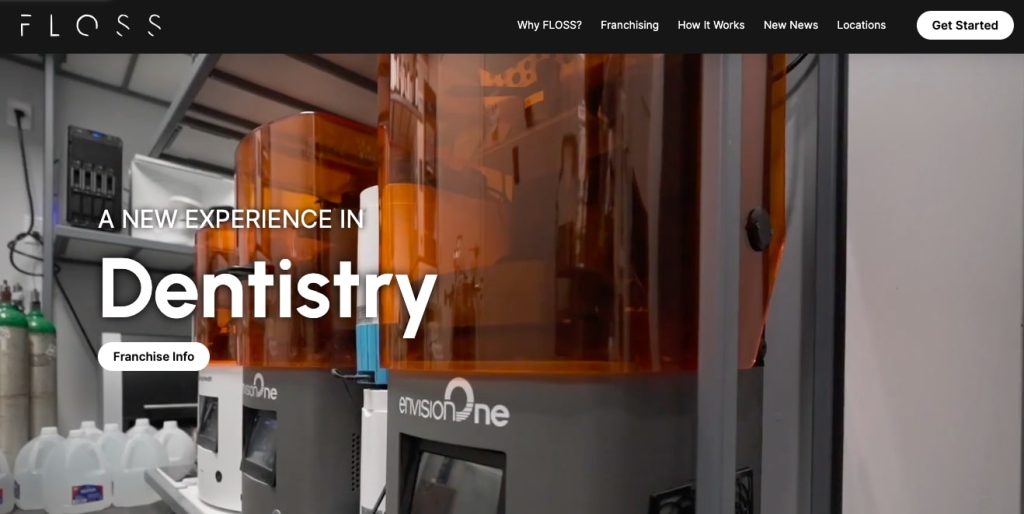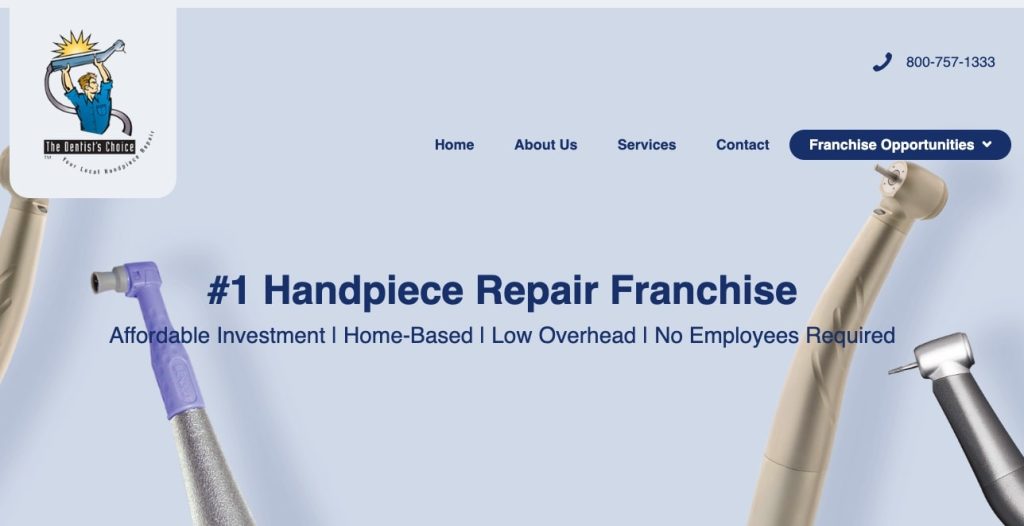The dental industry is experiencing significant growth, with an increasing demand for dental services. As a result, dental office franchises have become an attractive investment opportunity for entrepreneurs looking to enter the healthcare sector. In this comprehensive guide, we will explore the top dental office franchise opportunities in 2024, the benefits of investing in a dental office franchise, factors to consider when choosing a franchise, success stories from franchisees, steps to starting your own dental office franchise, common challenges faced by franchisees, and frequently asked questions about dental office franchises. By the end of this guide, you will have a thorough understanding of the dental office franchise industry and be equipped with the knowledge to make an informed decision.
The Growing Demand for Dental Services: An Overview of the Market
The dental industry is experiencing a surge in demand for services, driven by various factors such as an aging population, increased awareness of oral health, and advancements in dental technology. According to the Straits Research, the dental services market is projected to grow at a CAGR of 5.48% from 2023–2031. This growth presents a lucrative opportunity for dental office franchises to thrive in the market.
One of the key drivers of the growing demand for dental services is the aging population. As people age, they require more dental care, including preventive, restorative, and cosmetic treatments. Additionally, the increasing awareness of the importance of oral health has led to a higher demand for regular dental check-ups and treatments. Moreover, advancements in dental technology have made dental procedures more efficient, comfortable, and accessible, further contributing to the increased demand for dental services.
Exploring the Benefits of Investing in a Dental Office Franchise
Investing in a dental office franchise offers numerous benefits for entrepreneurs looking to enter the dental industry. One of the primary advantages is brand recognition. By joining an established franchise, you can leverage the reputation and credibility of the brand, which can help attract patients and build trust in the community. Additionally, dental office franchises often provide comprehensive support and training to franchisees, including assistance with site selection, marketing, and operational guidance. This support can significantly reduce the learning curve and increase the chances of success for franchisees.
Another benefit of investing in a dental office franchise is the potential for financial success. Dental services are considered essential healthcare, and the demand for these services is expected to continue growing. This steady demand, combined with the support and resources provided by the franchisor, can lead to a profitable business venture. Furthermore, dental office franchises often benefit from economies of scale, allowing franchisees to access discounted supplies and equipment, which can help improve profit margins.
Factors to Consider When Choosing a Dental Office Franchise
When considering a dental office franchise, there are several factors that potential franchisees should take into account. Firstly, it is important to assess the initial costs involved in opening a dental office franchise. These costs can vary significantly depending on the franchise brand, location, and size of the practice. Franchise fees, equipment costs, leasehold improvements, and working capital should all be considered when evaluating the financial feasibility of a franchise opportunity.
Secondly, location plays a crucial role in the success of a dental office franchise. Franchisees should consider factors such as population demographics, competition, and accessibility when selecting a location. A thorough market analysis can help identify underserved areas with high demand for dental services.
Thirdly, potential franchisees should evaluate the support and training provided by the franchisor. This includes assessing the level of initial training, ongoing support, and marketing assistance offered by the franchise. A strong support system can greatly contribute to the success of a dental office franchise.
Top Dental Office Franchise Opportunities in 2024: A Comparative Analysis
If you’re considering stepping into the dental industry through franchising, 2024 offers several promising opportunities. Dental office franchises provide a mix of established brand recognition, operational support, and strategic advantages which can appeal to both dentists and investors. Let’s take a closer look at some of these opportunities and compare their unique advantages and considerations.
Floss Franchise

FLOSS Franchise offers a luxury dental experience using the latest technology in upscale environments. This franchise focuses on general and cosmetic dentistry and leverages advanced digital workflow technologies.
Pros:
- Strong brand recognition in upscale dentistry.
- Comprehensive support including site selection, lease negotiation, and ongoing training.
- Access to the latest dental technology and group purchasing benefits.
Cons:
- Higher initial investment cost compared to some other franchises.
- Requires adherence to strict operational guidelines which might limit flexibility.
The Dentist’s Choice

Specializing in the repair of dental handpieces, The Dentist’s Choice offers a niche service within the dental industry. This franchise provides a low-cost entry point with training in repair services and business operations.
Pros:
- Lower initial investment and operational costs.
- Large protected territories offering significant market potential.
- Niche market reduces direct competition.
Cons:
- Limited to handpiece repair, offering less diversity in services.
- May require technical skills or additional hiring for specialized roles.
Aspen Dental

Aspen Dental is known for offering a full range of dental services, from basic to specialized care, with a focus on patient accessibility and affordability.
Pros:
- Well-established national brand with extensive marketing support.
- Comprehensive training and operational systems.
- Focus on high-traffic locations enhances patient base.
Cons:
- Some franchisees may find the corporate control too restrictive.
- High startup costs due to the need for fully equipped clinics.
Comfort Dental

Comfort Dental emphasizes affordable dental care with a unique franchisee partnership model. It offers significant flexibility in operations and marketing.
Pros:
- Partnership model reduces initial investment and operational risks.
- Strong focus on affordable services attracts a broad patient demographic.
- Flexibility in marketing and operations allows for localized adjustments.
Cons:
- Revenue sharing model may reduce individual profit margins.
- Less brand recognition compared to larger franchises.
Steps to Starting Your Own Dental Office Franchise: A Step-by-Step Guide
Starting your own dental office franchise requires careful planning and adherence to a step-by-step guide. Let’s outline the key steps involved in starting a dental office franchise.
- Research and Due Diligence: Begin by researching different dental office franchise opportunities and evaluating their pros and cons. Consider factors such as initial investment costs, support and training provided, and the reputation of the franchisor. Conduct thorough due diligence, including speaking with current franchisees and visiting existing franchise locations.
- Secure Financing: Determine the initial investment required to open a dental office franchise and explore financing options. This may include personal savings, loans, or partnerships. Create a comprehensive business plan that outlines your financial projections and demonstrates the viability of your franchise venture to potential lenders or investors.
- Select a Franchise: Once you have conducted thorough research and secured financing, select the dental office franchise that aligns with your goals and values. Consider factors such as brand reputation, support and training provided, and the potential for growth and profitability.
- Location Selection: Conduct a market analysis to identify underserved areas with high demand for dental services. Consider factors such as population demographics, competition, and accessibility when selecting a location for your dental office franchise. Work closely with the franchisor to ensure compliance with their location selection criteria.
- Franchise Agreement and Training: Review and sign the franchise agreement, which outlines the terms and conditions of your partnership with the franchisor. Attend the franchisor’s training program, which typically covers operational procedures, marketing strategies, and best practices for running a successful dental office franchise.
- Build and Equip Your Practice: Work with the franchisor to design and build your dental office. Ensure compliance with the franchisor’s branding and design guidelines. Purchase the necessary equipment and supplies, taking advantage of any discounts or preferred vendor relationships offered by the franchisor.
- Staffing and Training: Recruit and hire qualified dental professionals and support staff for your practice. Provide comprehensive training to ensure they are equipped with the necessary skills and knowledge to deliver high-quality patient care. Work closely with the franchisor to implement their recommended staffing and training protocols.
- Marketing and Grand Opening: Develop a comprehensive marketing plan to promote your dental office franchise. Utilize the marketing resources and support provided by the franchisor to attract new patients and build brand awareness. Plan a grand opening event to generate excitement and attract potential patients to your practice.
- Ongoing Operations and Support: Once your dental office franchise is up and running, focus on providing exceptional patient care and managing day-to-day operations. Stay in close communication with the franchisor and take advantage of the ongoing support and resources they provide. Continuously evaluate and improve your practice to ensure long-term success.
Overcoming Challenges: Common Obstacles Faced by Dental Office Franchisees
While dental office franchises offer numerous benefits, there are also common challenges that franchisees may face. Let’s explore some of these challenges and strategies for overcoming them.
- Competition: The dental industry is highly competitive, with numerous independent practices and dental office franchises vying for patients. To overcome this challenge, focus on differentiating your practice through exceptional patient care, personalized experiences, and innovative treatments. Leverage the support and marketing resources provided by the franchisor to effectively promote your practice and attract new patients.
- Staffing Issues: Finding and retaining qualified dental professionals and support staff can be a challenge for dental office franchisees. To address this, invest in comprehensive training programs and create a positive work environment that fosters employee satisfaction and loyalty. Offer competitive compensation packages and provide opportunities for professional growth and development.
- Operational Management: Running a dental office franchise involves managing various operational tasks, such as scheduling, billing, and inventory management. Implement efficient systems and leverage technology to streamline these processes. Take advantage of the operational guidance and best practices provided by the franchisor to optimize your practice’s efficiency and profitability.
- Patient Retention: Building a loyal patient base is crucial for the long-term success of a dental office franchise. Implement patient retention strategies, such as regular communication, appointment reminders, and loyalty programs. Focus on delivering exceptional patient experiences to foster patient loyalty and positive word-of-mouth referrals.
By proactively addressing these challenges and leveraging the support and resources provided by the franchisor, dental office franchisees can overcome obstacles and build thriving practices.
Frequently Asked Questions
Q.1: What are the initial costs involved in opening a dental office franchise?
The initial costs of opening a dental office franchise can vary depending on the franchise brand, location, and size of the practice. On average, the initial investment can range from $300,000 to $500,000. This includes franchise fees, equipment costs, leasehold improvements, and working capital. It is important to carefully evaluate the financial feasibility of a franchise opportunity and secure appropriate financing.
Q.2: How long does it take to break even and start making a profit?
The time it takes to break even and start making a profit can vary depending on various factors, such as location, market conditions, and the effectiveness of your marketing efforts. On average, dental office franchises can take 1 to 3 years to break even and start generating a profit. It is important to have a comprehensive business plan and realistic financial projections to manage expectations and plan accordingly.
Q.3: What support and training can I expect from the franchisor?
Franchisors typically provide comprehensive support and training to franchisees. This includes assistance with site selection, lease negotiation, marketing strategies, operational guidance, and ongoing support. Franchisees can expect initial training programs that cover various aspects of running a dental office franchise, including clinical protocols, administrative procedures, and marketing strategies. The level of support and training may vary between different franchise brands, so it is important to thoroughly evaluate the support provided before making a decision.
Q.4: Can I choose my own location for the dental office franchise?
While franchisees often have some flexibility in choosing a location for their dental office franchise, the franchisor typically has specific criteria and guidelines for site selection. Franchisors may conduct market analysis and demographic studies to identify underserved areas with high demand for dental services. It is important to work closely with the franchisor to ensure compliance with their location selection criteria and maximize the potential for success.
Q.5: What are the key qualities of a successful dental office franchisee?
Successful dental office franchisees possess several key qualities. Firstly, they have a strong work ethic and are committed to providing exceptional patient care. They are also effective communicators and can build strong relationships with patients and staff. Additionally, successful franchisees are proactive and adaptable, willing to learn and implement best practices recommended by the franchisor. Finally, they have a passion for the dental industry and a drive to succeed.
Conclusion
The future of dental office franchises looks promising, with emerging trends and opportunities shaping the industry. The increasing demand for dental services, driven by an aging population, increased awareness of oral health, and advancements in dental technology, presents a lucrative opportunity for dental office franchises to thrive in the market.
Investing in a dental office franchise offers numerous benefits, including brand recognition, support from the franchisor, and the potential for financial success. When choosing a dental office franchise, it is important to consider factors such as initial costs, location, and training provided. Several top dental office franchise opportunities are available in 2024, each with its
